NEWSLETTER
Subscribe to receive the latest news and performance tips.
+36 70 426 8841 | support@hammer-nutrition.hu
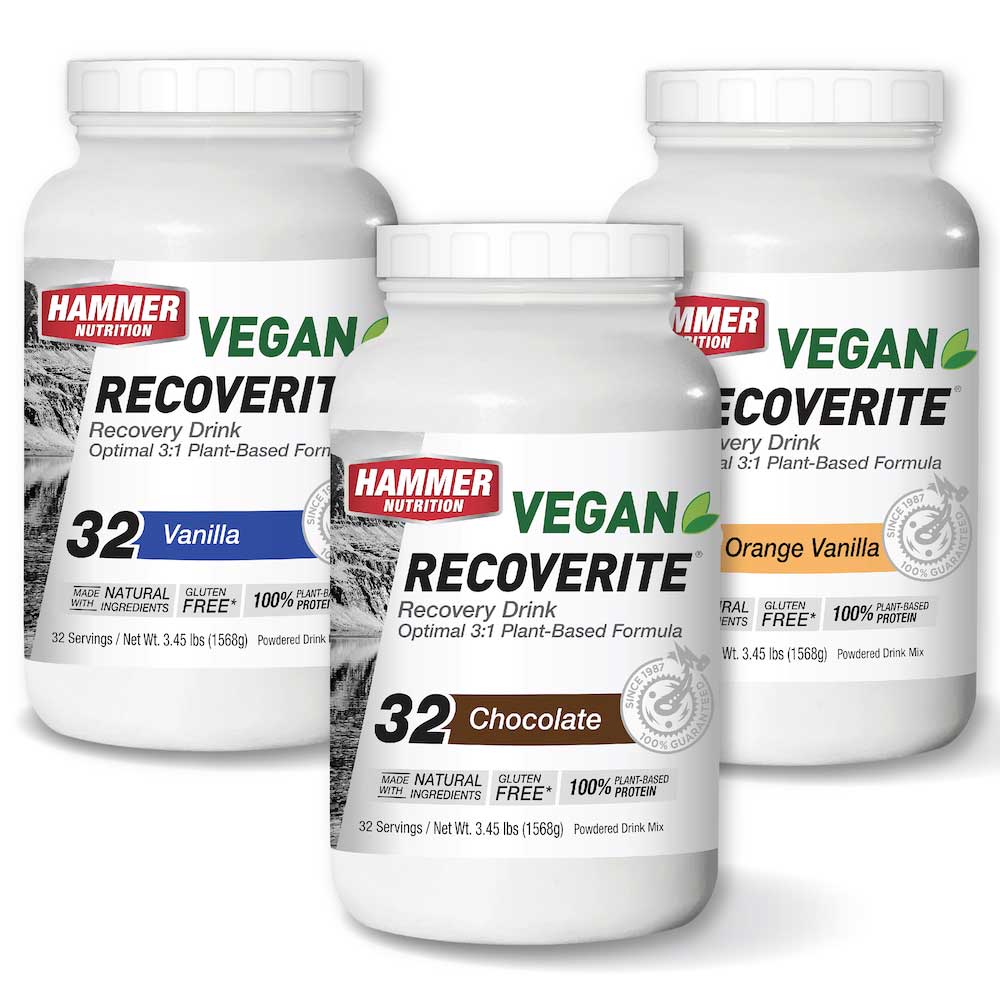

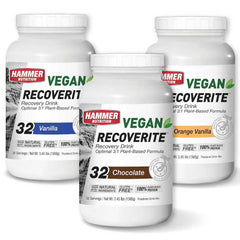
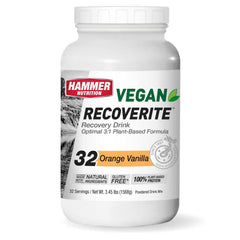
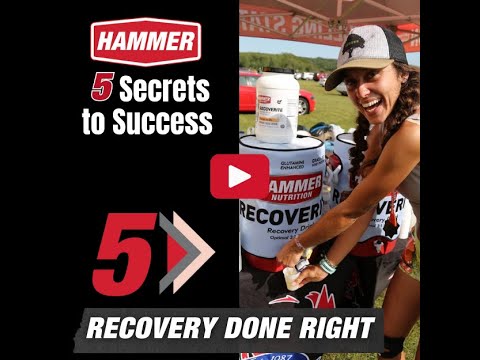
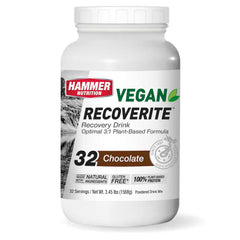
Optimizes regeneration, the vegan way.
Everything that makes Recoverite our best-selling product—formulated to fit a vegan diet! Just like the original, Vegan Recoverite offers a 3:1 ratio of complex carbohydrate to complete protein, specifically designed to jump-start the recovery process. This new formula’s plant-based protein will help you maximize your gains, regardless of dietary preferences.
It tastes great, mixes easily, and includes the same ideal electrolyte profile and amino acid supplementation that Recoverite fans have relied on for years. Recovery matters. Do it right with Vegan Recoverite— the simple and effective solution for all!
Recoverite contains whey protein isolate, while Organic Vegan Recoverite contains organic pea protein. If you is adhering to a vegetarian/vegan diet, the latter is an excellent protein source. Considered the least allergenic of all protein sources, organic pea protein is also regarded as arguably the easiest plant protein to digest. Organic pea protein contains an excellent amino acid profile—it’s a rich source of the three branched-chain amino acids (BCAAs) L-leucine, L-isoleucine, and L-valine—and is gluten-free and lactose-free. That said, there is no better protein source than whey protein isolate when it comes to bioavailability and Essential Amino Acids (EAA) content, including the three branched-chain amino acids. There are a number of additional benefits attributed to whey protein isolate that no other protein source can offer. You can read more about this at Stay Strong and Stay Healthy.
No scoop? No problem! With the following conversion information, your "Where did my scoop go?" problems are resolved!
Vegan Recoverite
1 Level Scoop (73 cc) = 4 TBSP + 3 tsp (Serving Size: 2 Scoops)
That's where Recoverite comes in, providing unsurpassed nutritional support to ensure you obtain the maximum value from your workouts and complete recovery after each training session and race.
What we do in training is definitely important, no question about it, but if we neglect to consistently take the proper steps to recover properly, we will never get the full value out of the time and energy spent in training. Remember, the gains we make in our training occur during recovery, but only in the presence of adequate rest and optimal nutritional support. If we don’t attend to that, we not only miss out on the benefits of our workouts, we can create more problems such as getting sick or injured. The key to kick-starting the all-important recovery process is the replenishment of high-quality carbohydrates and protein immediately after exercise (within the first 30 minutes, the sooner the better). When you give your body this kind of support when it's most receptive to replenishment, which it is the minute you stop exercising, it will respond by:
Recoverite and Organic Vegan Recoverite provides your body with the ideal 3:1 ratio of carbohydrates to protein, along with generous amounts of multi-beneficial glutamine (a whopping three grams per serving!), the potent antioxidant l-carnosine, and a full-spectrum electrolyte profile. The result is rapid and enhanced recovery, allowing you to obtain the maximum value from all of your workouts and ideally prepping your body for your next workout or event.
None of the flavors of Organic Vegan Recoverite contain caffeine.
Q: Would I lose any nutritional benefits if I mix Recoverite or Organic Vegan Recoverite with warm water instead of cold water?
A: Nope! It's totally fine to mix either product with warm water, and there will be no loss of potency or benefits.
Q: I’m allergic to soy. Does Recoverite and/or Organic Vegan Recoverite contain soy?
A: Neither product contains any soy or soy protein.
Erythritol is a natural sweetener, which, like xylitol, is classified as a polyol. Erythritol, unlike xylitol and other polyols, contains no calories. It is also non-glycemic and considered suitable for people with diabetes because it does not raise plasma glucose or insulin levels. Like xylitol, erythritol also promotes oral health, as it does not ferment and support the acid-producing bacteria that cause tooth decay.
There are two things about Recoverite and Vegan Recoverite that make them not good choices for use during exercise:
1) The carb to protein ratio in Recoverite is 3:1, which, while not harmful, is not ideal during exercise. During exercise only a small portion of the body’s energy requirements—somewhere between 8% - 12%—need to be fulfilled via protein. With that being the case, the carb to protein ratio should be skewed much more in favor of carbohydrates than protein, with a 7:1 or 8:1 ratio being ideal. This is where our long-distance fuels come in— Perpetuem and Sustained Energy.
2) The l-glutamine (aka glutamine) that we add to the product is the primary issue. Glutamine is an incredibly beneficial amino acid, but it’s not ideal to consume it prior to or during exercise, as it will produce some ammonia when it’s first metabolized. After exercise, when the muscles are no longer actively working, this is not problematic at all, and all the benefits that glutamine provides can be enjoyed. During exercise, however, you are already producing ammonia (it can’t be completely avoided), which is a primary cause of fatigue, and you don’t want to do anything to exacerbate the problem. But that’s exactly what happens when you consume glutamine supplements or glutamine-enhanced fuels during exercise... you increase the body's ammonia "burden." Interestingly, in about 3-hours’ time, glutamine actually becomes an effective ammonia scavenger, neutralizing/detoxifying the ammonia it produces, and then some. The problem is that during exercise you don’t have the luxury of waiting 3 hours for glutamine to scavenge ammonia the ammonia it initially produces and more.
For best results, use Perpetuem or Sustained Energy during exercise and save Recoverite for after your workouts.
Q: I just ordered Recoverite for the first time and have heard so many amazing things about the product. However, I've noticed that the main ingredient is maltodextrin. A simple search for this ingredient exposes that many people believe that it is worse than sugar and very high on the glycemic index. I understand that it is included in the produced because it is considered a complex carbohydrate, but from my initial understanding, it is not a good additive, particularly when it is the main ingredient? Also, since the ingredient is so high on the Glycemic Index, is this a good product to use when someone is trying to be fat adaptive?
A: When you finish an exercise session, two things are highly active for a relatively short period of time--one is an enzyme known as glycogen synthase and the other is insulin. Glycogen synthase is responsible for taking your carbohydrate intake and converting it into glycogen for storage in the muscles and liver. You have depleted your stores of glycogen, so it's crucial to "refill the tank" so that you have those stores replenished and ready for tomorrow's workout. Insulin, along with glycogen synthase, is what drives this glycogen into the muscle cells. One reason why maltodextrin is ideal for post-workout carbohydrate replenishment is precisely because of its high glycemic index rating. With the activity of insulin and glycogen synthase only remaining at high levels for a very short time, a quick-acting carbohydrate source is not only ideal, it's quite necessary. The quicker acting the carbohydrate source, the quicker you will kick-start the glycogen restoration process. We remain equally convinced that carbohydrates are vitally important—they are the key component—when it comes to fueling your body during exercise, especially in regards to being able to use fat as an energy source most efficiently and effectively. We also believe that carbs are extremely important to consume (protein as well) after your exercise session has been completed. The carbs are needed to replenish the muscle cells and the liver with fuel, and the protein will provide the amino acids needed for muscle tissue repair and immune system support. Lastly, the only time we recommend the consumption of a high-Glycemic Index carbohydrate like maltodextrin are during exercise and immediately after.
Each 2-scoop serving of Recoverite and Organic Vegan Recoverite contains 3,000 mg of l-glutamine.
All of our CBD products are manufactured in an entirely different city (and thus, a completely different facility) than any of the other Hammer Nutrition products, including Recoverite and Organic Vegan Recoverite.
Because whey protein isolate—the form we use in Recoverite and Whey Protein—most people who are lactose intolerant are able to consume whey isolate without issue. If you find either product to still cause issues, we recommend Vegan Recoverite and Vegan Protein.
Q: Why do some of your products contain what seems to be a high amount of manganese, especially when the upper limit for daily intake of manganese is 11 mg.
A: For the most part, the Upper Intake Level (UL)—as it is for other medical/government standards such as the RDA, RDI, and DV—is a standard intended for the general population, and not really applicable for athletes who use/deplete these nutrients at a much higher level than sedentary people do.
When athletes take in nutrients like manganese and the others in an electrolyte product, these nutrients don’t just accumulate, stacking up higher and higher until they reach and exceed UL amounts. Instead, these nutrients—manganese included—are used (and thus, used up) to perform many important bodily functions that occur during exercise. Put another way, when we use a product like Endurolytes Fizz, for example, we are simply resupplying the body with nutrients that it has used up internally to perform the actions they do and/or that are lost in sweat and urine.
Manganese plays an important role as part of the natural antioxidant enzyme superoxide dismutase (SOD), which helps protect against the damage caused by free radicals. Dr. Bill Misner writes, “Manganese is necessary in trace amounts for optimal muscle cell enzyme reactions for the conversion of fatty acids and protein into energy. Researchers suggest that manganese deficiency plays a vital role in glucose tolerance factor (which acts as a physiological enhancer of insulin activity), free radical build-up from intense exercise, and nerve function disorders, especially in older athletes. Endurance exercise increases the rate manganese is lost from the body. Also, please note [there are] three inhibiting minerals—calcium, magnesium, potassium—in both HEED and the Endurolytes products that reduce total absorption rate of manganese.”
Dr. Misner goes on further to state, "You lose (without exercise) an average of 4 mg of manganese from the body each day in the feces (via bile). Typically, when orally dosed, only 3-5% of Manganese is absorbed into the body."
Therefore, because of the role manganese plays in a number of bodily functions during exercise...
... plus, the fact that absorption rates of orally dosed manganese are extremely minimal, and are also inhibited somewhat by the calcium, magnesium, and potassium components in many of our fuels, we believe that the small amount of manganese we include in them is absolutely merited.
With the Optimum Daily Intake (ODI) of manganese set, as per Dr. Nancy Lieberman, at 15 mg to 50 mg per day, and taking into account that ingested manganese is "used up" during exercise (both for energy-production purposes and antioxidant support), as well as being depleted via sweat and urine, we are convinced that the amounts of manganese we use in our products are not only merited, but extremely beneficial. In fact, highly regarded sports scientist, Dr. Michael Colgan, writes, "Because of their greater bone and soft tissue turnover and their higher metabolism of glucose, athletes may need more manganese than sedentary folk." Now, if someone is sedentary and not exercising, this much manganese is not necessary.
As far as toxicity is concerned, Dr. Lieberman states, "The toxicity for manganese is low when it is ingested in the form of either manganese-rich foods or supplements. Toxicity can occur, however, when manganese is inhaled, as in the case of certain miners who are exposed to high concentrations of manganese oxide in the air." Dr. Michael Colgan elaborates, "Manganese is considered one of the least toxic of the trace elements if taken by mouth."
Our position is that athletes and active people do require a bit more manganese than do sedentary people (though again, Dr. Lieberman's ODI for the general population is set at much higher 15-50 mg/day). With manganese being utilized and thus depleted during exercise for a number of reasons (not simply ingested and stored), we believe that the small amount of manganese in not only merited, but tremendously beneficial.
On a personal note, my (Steve Born) last big thing in my chosen sport of ultramarathon cycling was a record attempt that saw me on my bike for 75.5 hours. I used the original Endurolytes product at a dose of 3-6 capsules per hour, depending on the weather conditions through the Mojave Desert. After successfully completing the record attempt, I calculated that I took in somewhere between 300 and 340 Endurolytes capsules, which means I was intaking 75 – 85 milligrams of manganese. Nothing even close to a toxic response ever occurred, and it was never anything that I was concerned about, the reason being that I knew that I was simply replenishing what my body had used up internally and/or sweated out.
Here are the benefits of maltodextrin, along with information about its effects on insulin during exercise and shortly after it’s been completed.
The Benefits of Maltodextrin
Because of maltodextrin’s high Glycemic Index (GI), many people ask about the insulin release that occurs. The answer to that is that, yes, maltodextrin does elevate blood sugar levels very rapidly and will cause an insulin release. This is not an issue immediately prior to exercise, during exercise, however, as Dr. Misner explains: "During exercise, insulin release is inhibited because sympathetic nervous system hormones are also released and, concurrently, exercise augments muscle uptake of glucose from exogenous intake accompanied by lower insulin levels and effects." Basically, what Dr. Misner is saying is that because energy turnover is very high, and with the release of specific central nervous system hormones, the body is able to deliver glucose to the muscles with very minimal insulin… insulin release is not a significant factor during exercise.
After exercise, when the body needs to have its cells restocked with fuel, maltodextrin’s high Glycemic Index is also desirable… Recoverite and Organic Vegan Recoverite are PERFECT fuels for maximizing recovery.
Those are the only three times—immediately prior to exercise, during exercise, and shortly after exercise—when a high-GI carbohydrate such as maltodextrin should be consumed.
Both Recoverite and Organic Vegan Recoverite are most definitely suitable for diabetics. Shortly after exercise—ideally within the first 30 minutes after it has been completed—when the glycogen synthase enzyme is highly active and when insulin is needed to work with glycogen synthase to convert ingested carbohydrates to glycogen for storage in the muscles, a high-glycemic index (GI), insulin-releasing/spiking carbohydrate such as maltodextrin is highly desirable. Aside from shortly prior to, during, and immediately following exercise, we do not recommend consuming high-GI carbohydrates, including maltodextrin. Additional Note: Maltodextrin is the ideal choice for pre-diabetic and diabetics, as long as its use is limited to during exercise and immediately after. As just mentioned, at all other times we recommend consuming low-to-moderate glycemic index carbohydrates. It’s important to mention that a sizable number of our clients are Type I and Type II diabetics, including sponsored athlete Peter Van Rompaey, and they find our maltodextrin-containing products to be ideal for them.
Mix 2 level scoops of Vegan Recoverite (49g) with 8-16 ounces (236-473ml) of water. Consume immediately after exercise. If you’re not able to eat a full meal within one hour of completing your exercise, take a second serving.
Organic Maltodextrin (From Tapioca) – A high-glycemic index (GI) complex carbohydrate, ideal for providing fast-acting, long-lasting energy during exercise and for replenishing the body’s energy (glycogen) stores after exercise.
Organic Pea Protein – Considered the least allergenic of all protein sources, organic pea protein is also regarded as arguably the easiest plant protein to digest. Organic pea protein contains an excellent amino acid profile—it’s a rich source of the three branched-chain amino acids (BCAAs) L-leucine, L-isoleucine, and L-valine—and is gluten-free and lactose-free.
L-Glutamine – The most abundant amino acid in the muscles, L-glutamine plays a significant role in the glycogen synthesis process, and helps repair and rebuild muscle tissue. It has also been shown to help raise bodily levels of glutathione, the most important antioxidant for immune system health. Glutamine also contributes to growth hormone release and digestive health.
Erythritol – A natural sweetener, which, like xylitol, is classified as a polyol. Erythritol, unlike xylitol and other polyols, contains no calories. It is also non-glycemic and considered suitable for people with diabetes because it does not raise plasma glucose or insulin levels. Like xylitol, erythritol also promotes oral health, as it does not ferment and support the acid-producing bacteria that cause tooth decay.
Full-spectrum electrolyte profile – The complete profile of sodium, chloride, calcium, magnesium, and potassium helps replenish depleted mineral stores.
Stevia – This is the extract (steviosides) from the leaves of Stevia rebaudiana, a plant native to subtropical and tropical Central and South America. Stevia is non-caloric, and does not affect blood sugar levels. Like xylitol, stevia does not support acid-producing bacteria responsible for tooth decay.
L-Carnosine – One of the most versatile and beneficial nutrients available. It buffers lactic acid during exercise and offers antioxidant support.
Manganese – This trace mineral plays an important role in the production of superoxide dismutase (SOD), a powerful antioxidant.
Chromium Polynicotinate – This trace mineral helps regulate blood sugar and plays a vital role in energy production and the synthesis of glucose, fatty acids, and amino acids.
Sea Salt – Added to Chocolate Vegan Recoverite only to balance the flavor profile.
| Vegan Recoverite Chocolate Nutrition Facts |
||
|---|---|---|
| Serving Size: 49g (2 Level Scoops) | ||
| Amount Per Serving | % Daily Value* | |
| Calories | 180 | |
| Total Fat | 1g | 1% |
| Saturated Fat | 0g | 0% |
| Trans Fat | 0g | |
| Cholesterol | 0mg | 0% |
| Sodium | 160mg | 7% |
| Total Carbohydrate | 30g | 11% |
| Dietary Fiber | 0g | 0% |
| Total Sugars | 1g | |
| Added Sugars | 0g | 0% |
| Protein | 10g | |
| Vitamin D | 0mcg | 0% |
| Calcium | 130mg | 10% |
| Iron | 0mg | 0% |
| Potassium | 20mg | 0% |
| Magnesium | 42mg | 10% |
| Manganese | 0.6mg | 25% |
| Chromium | 9mcg | 25% |
| Chloride | 183mg | 8% |
| L-Glutamine | 3000mg | |
| *Percent Daily Values are based on a 2,000 calorie diet. | ||
| Ingredients: Organic Maltodextrin (From Tapioca), Organic Pea Protein, Natural Flavor, L-Glutamine, Erythritol, Cocoa Powder, Calcium Chelate, Sea Salt, Stevia, Magnesium Chelate, Potassium Chelate, L-Carnosine, Manganese Chelate, Chromium Polynicotinate. No corn or soy. |
||
| Vegan Recoverite Orange-Vanilla Nutrition Facts |
||
|---|---|---|
| Serving Size: 49g (2 Level Scoops) | ||
| Amount Per Serving | % Daily Value* | |
| Calories | 180 | |
| Total Fat | 1g | 1% |
| Saturated Fat | 0g | 0% |
| Trans Fat | 0g | |
| Cholesterol | 0mg | 0% |
| Sodium | 40mg | 2% |
| Total Carbohydrate | 31g | 11% |
| Dietary Fiber | 1g | 4% |
| Total Sugars | 0g | |
| Added Sugars | 0g | 0% |
| Protein | 10g | |
| Vitamin D | 0mcg | 0% |
| Calcium | 130mg | 10% |
| Iron | 0mg | 0% |
| Potassium | 20mg | 0% |
| Magnesium | 42mg | 10% |
| Manganese | 0.6mg | 25% |
| Chromium | 9mcg | 25% |
| L-Glutamine | 3000mg | |
| *Percent Daily Values are based on a 2,000 calorie diet. | ||
| Ingredients: Organic Maltodextrin (From Tapioca), Organic Pea Protein, L-Glutamine, Natural Flavor, Erythritol, Calcium Chelate, Stevia, Magnesium Chelate, Potassium Chelate, L-Carnosine, Manganese Chelate, Chromium Polynicotinate. No corn or soy. |
||
| Vegan Recoverite Vanilla Nutrition Facts |
||
|---|---|---|
| Serving Size: 49g (2 Level Scoops) | ||
| Amount Per Serving | % Daily Value* | |
| Calories | 180 | |
| Total Fat | 1g | 1% |
| Saturated Fat | 0g | 0% |
| Trans Fat | 0g | |
| Cholesterol | 0mg | 0% |
| Sodium | 160mg | 7% |
| Total Carbohydrate | 30g | 11% |
| Dietary Fiber | 1g | 4% |
| Total Sugars | 0g | |
| Added Sugars | 0g | 0% |
| Protein | 10g | |
| Vitamin D | 0mcg | 0% |
| Calcium | 130mg | 10% |
| Iron | 0mg | 0% |
| Potassium | 20mg | 0% |
| Magnesium | 42mg | 10% |
| Manganese | 0.6mg | 25% |
| Chromium | 9mcg | 25% |
| L-Glutamine | 3000mg | |
| *Percent Daily Values are based on a 2,000 calorie diet. | ||
| Ingredients: Organic Maltodextrin (From Tapioca), Organic Pea Protein, L-Glutamine, Natural Flavor, Erythritol, Calcium Chelate, Stevia, Magnesium Chelate, Potassium Chelate, L-Carnosine, Manganese Chelate, Chromium Polynicotinate. No corn or soy. |
||
Thanks for subscribing!
This email has been registered!